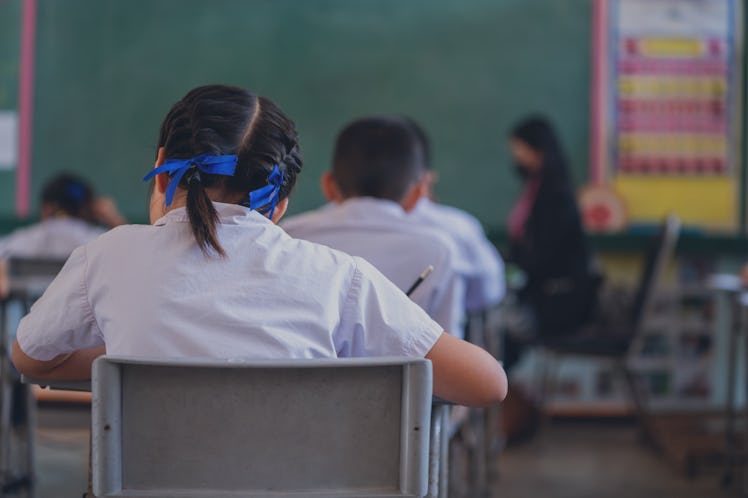Students With Disabilities Are Disciplined Way More Than Their Peers. Biden Wants To Change That.
Following the release of a report noting higher rates of discipline aimed at disabled students, the guidelines aim to address the disparities.

On Tuesday, July 19, the Biden administration issued new school guidelines calling for a stop to the over-discipline of students with disabilities. Following the release of a federal report that noted higher-than-average rates of discipline aimed at disabled students, the new guidelines aim to address the disparities. Here’s what you need to know.
According to The Hill, the federal report found that students served under the Individuals with Disabilities Education Act made up 13.2% of the total number of students enrolled in the 2017-2018 school year. In total, that works out to be approximately 8 million students. But disabled kids made up 23.3% of expulsions with educational services and 14.8% of expulsions without education services that year.
In addition to the data the federal data, a 2021 report authored by Daniel J. Losen, director of the Center for Civil Rights Remedies, and his colleagues found that among disabled students, 24% of Black students in middle school and high school were suspended at least once, which is high, especially when compared to the 11% of white students.
According to The Washington Post, Losen said that in 134 medium to large school districts, at least 40% of Black secondary students with disabilities were suspended at least once during the school year.
The Department of Education (DOE) report highlights how frequently kids with disabilities face discipline — noting that the discipline is likely in response to behavior that stems from the students not being given the modifications, supports, or services they need in the classroom.
Instead, in response to these needs not being met, students are “frequently disciplined in a discriminatory way,” Disability Scoop notes, adding that the consequences are often “more severe than for others exhibiting similar behaviors.”
The federal report highlights a few examples of situations in which students may be punished for an offense related to a disability. One example notes that a student whose Tourette’s syndrome causes them to curse involuntarily should not receive the same consequence, such as detention or suspension, as a non-disabled student interrupting the class on purpose.
It’s that type of discrimination that the report hopes to address. Federal officials have called the new guidance highlighting the civil rights of students with disabilities “the most comprehensive ever released.” The guidance was created to give “tools for schools to assist students in addressing any disability-based behaviors that could otherwise interfere with their or other students’ learning, or that could lead to student discipline or impact safety.”
The guidelines also looked at schools’ use of restraints against and removal of disabled students. The DOE states that it “is not aware of any evidence-based support for the view that the use of restraint or seclusion is an effective strategy in modifying a child’s behaviors that are related to their disability.” And in some cases, doing so may violate the rights of students with disabilities.
The guidelines state that “restraint or seclusion should not be used except in situations where a child’s behavior poses an imminent danger of serious physical harm to themselves or others.” Schools are encouraged to contact crisis intervention specialists or law enforcement in situations where safety is a concern. However, it’s important to note that contract workers, police, and specialists are legally required to abide by the new guidelines in classrooms as well.
The DOE guidance also addresses the reality that more than two years of pandemic learning has impacted students, and behavioral issues have reportedly increased, making the release of the guideline report all the more important.
“This work is especially urgent now, as our schools and our students and families continue to heal from the pandemic,” Education Secretary Miguel Cardona said. “Exclusionary discipline, such as out-of-school suspensions, can exacerbate these challenges — increasing stress that might lead to a greater sense of social isolation and diminished academic achievement.”